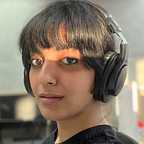My identity in cyberspace
In a Netflix original I watched recently, a protagonist was offered ‘e-death’ — an opportunity to have all traces of her existence extracted from physical and digital spaces. I was jealous, because over time, I’ve come to crave digital suicide — a purging of all of my past lives.
My blame escapes all people, even myself, and inevitably falls on the throttling social architecture generated by big tech.
I can’t articulate the reason yet, but it has something to do with dissonance. The thing about being visible on the internet is that I don’t know who the person on the screen is, because I have never been her.
Let me try to explain what it feels like:
You have two selves. This first is the one that you own — she goes to college or work, squabbles with family, falls in and out of love, and on and off the wagon. You may not like her at all times, but she’s yours — limbs, experiences, catchphrases, irrational fears, and all.
The second is the self that you don’t own. She is your perception, travelling through cyberspace without you. She appears in scripts created by strangers, plays a dangerous game with the idea of perfection, and spirals more and more out of your control as you embrace the space-time warp of the internet.
Your second self is not you because she has no memory of you. The words you’ve read, the lessons you’ve learnt, the trauma you’ve experienced, and the thoughts that race through your mind every second of every day don’t exist in this digital vignette. She is words and a picture on a screen, an insignificant part representing a solid whole.
The average internet user knows her better than you do. The perception is their creation — the digital public owns your image.
Your second self is an enigmatic creature, ever-evolving in accordance with what people want her to be. A genius on a good day, a brat on a bad one. You watch from the sidelines as she turns into a thing of someone else’s making, and you realise that you lost control a long time ago.
On the Internet, a woman in the public eye is public property. You’re relieved that you’re only ‘kind of’ visible and not in the territory of celebrity — your critique mostly happens where you can see it. You’re not yet a name in a conspiracy theory, a widely circulated meme, a misappropriated quote, a sexual fantasy, a doctored and obscene video, or a punchline.
But what your second self is, is a commodity — an object of wonder, ridicule, and public or private commentary. Critique is performed in front of her, as if she was never really here, because it is the faint reflection that people are concerned with — the empty aesthetic, the idea of a woman.
You start to lose your first self. The world abandoned her in favour of the version they can control, and you follow in their footsteps. You’re a people-pleaser, and so you entertain their whims and fancies, even if they leave you a little broken. You adopt her and internalise the hollowness. You feed on projected assumptions and insecurities.
And now, you’re not so sure about who you are anymore.
I once wrote a song about how I could never really understand my own needs as long as I was living under my parents’ roof, because our desires from my life were too intertwined. It started with:
Insecure in my identity,
I don’t want you to look at me.
I am who I was made to be,
Moulded collectively.
As I grew up, I managed to gain ownership over myself. However, I can’t help but think about how the same sentiment is reflected in my thoughts about my identity. In both cases, controlled narratives and lost agency paralyze me.
Is it the profit-oriented interests of big tech that have permitted this phenomenon? Is it the amplification of human nature through the public sphere that is the internet? Is it me?
I’m tired of being consumed, but I’m feeding off of it, too.
The only thing that I’ve been good at is creating, compulsively. I think that’s true for most of us. What I want from ‘social’ communities is to be able to share what I create, because my work and leisure childishly demand an audience. But I am so marred by censorship, vigilance, and scrutiny, that the joy of it all is seeping.
The trade-offs have never been clearer to me.
